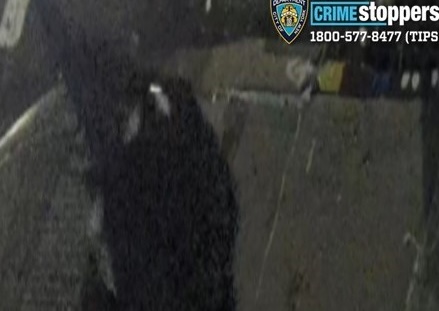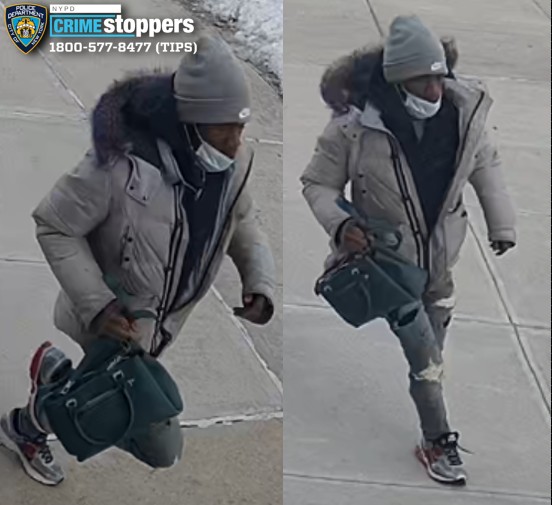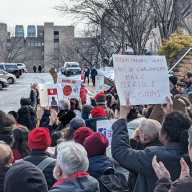In the heart of Woodside, inside the cozy Moa Coffee, Queens resident Rafi Islam—an organizer with the membership-based organization Street Vendor Project (SVP)—set down his cup of coffee and greeted me with a warm smile.
The rhythmic hum of the espresso machine underscored our conversation as he shared his journey from growing up in Bangladesh, where street vendors were an integral part of daily life, to becoming an advocate for New York City’s street vendors. As a founding member of Jhal NYC, Islam’s work has evolved from selling Bengali street food to empowering immigrant communities. Now, as part of SVP’s ongoing fight for vendor rights, he is pushing for legislative reforms that would expand access to licenses, decriminalize vending, and create new city support structures—all while preparing for the looming challenge of mass deportations in NYC.
He first learned about the SVP in 2016 after being nominated by the Vendy Awards, a former annual competition that highlighted the best street vendors in NYC. Jhal NYC implored him to join the SVP to champion Bengali vendors, which he subsequently did in 2021. The SVP has advocated for the City Council to pass the Street Vendor Reform package, which includes four bills to ensure more access to licenses, decriminalize vending, reform public siting, and create a division within the NYC Department of Small Business Services (SBS) to support street vendors. Now, the SVP and other coalition organizations are preparing for the mass deportations in NYC.
You’ve been working with the SVP as an organizer for four years. What is it about their mission statement that resonated with you?
The SVP advocates for street vendors and educates them about rules and regulations. I once started as a food vendor. My cousins and I started a food vending business selling Bengali street food in 2015. Then, we were nominated by the SVP [for the Vendy Awards] the next year, so that’s when I learned about the work they do, which is supporting and fighting for the street vendors’ rights. I wanted to join the fight because I wasn’t the one vending on the streets or facing all these challenges. I thought I could be on the other side and fight for them. There was a chance to join the SVP in 2021, and I thought, “This is my chance. I have to be a part of this movement to fight for the street vendors of New York City.” You get to see what it is to be a street vendor and learn about their cultural experiences. So, all those things I would say are what drew me to work for the SVP.
How is the SVP preparing for the second Trump Administration?
We have joined other coalitions. That’s mostly where we are at. We joined NYIC [New York Immigration Coalition]. We joined Make the Road New York [MRNY]. We joined Mixteca. These are some of the organizations that formed a coalition to fight the politicians that are going to be coming from the new [Trump] Administration. As we know, the coalition is always the better option when it comes to fighting for something, whether it’s a bill, their [street vendors] rights, or a movement. The NYIC has been trying to get those bills [the Street Vendor Reform package] passed.
The SVP has been joining them in their efforts, and we’re doing our best to inform street vendors: “What should we do when ICE shows up? Where can they show up?” They [ICE] have the power to operate a search and issue a warrant for your arrest. We have a membership meeting in our office held every month, usually on the second Tuesday of the month, where we talk about street vending issues. We have WhatsApp chats where communities send text messages and let each other know what’s happening. That’s pretty much where we are right now.
What are your plans to assist vulnerable immigrant communities?
There is always a limited amount of support and resources that we can provide. Going back to my answer of joining other organizations to help them with resources, I think joining coalitions is the key here, as well as hosting workshops and monthly meetings and connecting them [street vendors] with legal offices. Especially spaces where they can learn more about their rights and seek legal assistance. I think the more informed they are, the better it is. And ensure they stay in touch with their community and keep up with the news. We’re both actively learning from each other. If ICE were to unfortunately show up at your door, we would understand their process, and we’d be able to use that to inform others.
Informing the public is the best way to guard themselves from whatever ICE has planned.
That would be the first step. Many of them [street vendors] become vendors as an easy option. It’s an easy option for them because a lot of them did not have the privilege to get educated or spend time learning about social issues. They had to look after their families and did not have much free time to understand what was happening. I think informing them and passing the bills [the Street Vendor Reform package] is our priority. We’re actively fighting against the [Trump] Administration. There will need to be more fights in the future, like figuring out how to tackle the [Trump] Administration from coming after New Yorkers. It’s a lot up in the air because we’re trying to understand what they’re trying to do. We have concepts of a plan. [Laughs] But I think the more we learn, the better prepared we are.
We are also working with some council members fighting for us to get a hearing for the bills [the Street Vendor Reform package]. The SVP formed the Street Vendor Justice Coalition [SVJC], where other organizations joined us in working towards a common goal: advocating for the street vendors.
About a month ago, the SVP protested in front of City Hall asking Mayor Adams and City Council to defend immigrants from mass deportations. Do you feel that you got your message across?
Yes, I would say so. I think every action is a step forward. If nothing changes, we will at least let them [City Council] know that we’re here to fight. We’re trying to show them [City Council] that we can and will continue to fight for the people we care about — the immigrants and the community, including the street vendors. We joined other organizations for that protest. We had some speakers talk about how this would play out in the near future. Some members shared their frustrations about how they’re just trying to make a living, and now they’re not sure where to go. We’re waiting to see if we can implement the bills [the Street Vendor Reform package]. That way, we’ll be better prepared for the deportations or anything happening under the new [Trump] Administration. We’re trying to learn and prepare as much as we can. We will fight the fight.
This interview has been condensed and edited for clarity.


































